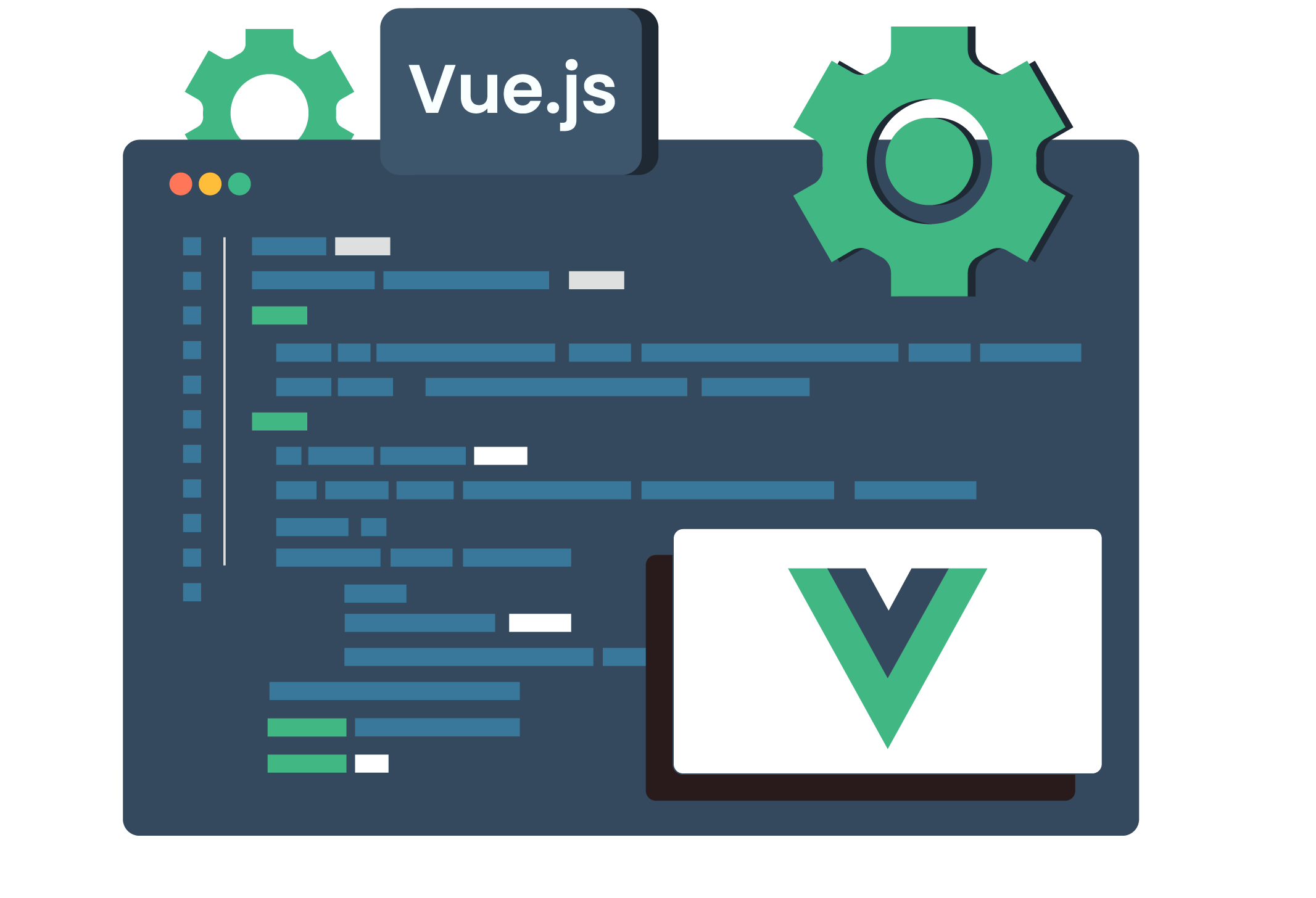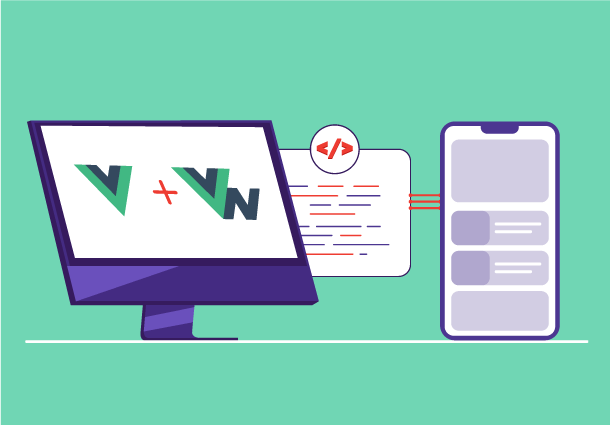Enthralling Mobile Occurrences: Scrutinizing Vue.js for Seamless User Peregrination
As we all know, change is the only constant. In this world of digital era, every day, technology is getting advanced. And for businesses looking to stay ahead in this digitalization game, developing engaging mobile experiences is essential. Revolutionizing Mobile app development, Vue for mobile apps offers a more efficient method. Ensuring smooth interactions across devices, Vue.js’s strong ecosystem and straightforward framework make it easier to create dynamic and responsive user interfaces. The importance of Vue.js in mobile development is explored in this book, along with its benefits and potential to improve user experiences. With the help of Vue.js, developers can create user-friendly mobile apps by streamlining complicated procedures and maximizing performance.

With Vue.js, developers can take full advantage of well-known web technologies and tools, speeding up development without sacrificing functionality or performance. Because of its component-based architecture, which encourages code reuse and maintainability, teams can expand their mobile projects effectively. Vue.js also has a thriving community and copious documentation, which gives developers plenty of resources to learn from and further their careers. As companies work to create engaging mobile experiences, Vue.js shows itself as a flexible and strong option that can handle a wide range of project needs.
Vue.js facilitates smooth integration with widely used mobile frameworks and libraries, allowing developers to take advantage of pre-existing resources and knowledge. Vue.js offers the agility and flexibility required to meet changing market demands, whether developing native or hybrid apps. Because of its emphasis on simplicity, Vue.js frees developers from the burden of technical complexity so they can concentrate on creativity and innovation. Vue.js is a dependable ally that helps organizations fulfill their vision and create remarkable mobile experiences as they traverse the competitive world of mobile app development.
Framework Fundamentals, Features, and Integrations of Vue for Mobile Apps
With its streamlined method for creating flawless user experiences, Vue.js has become a potent tool for creating mobile applications. Comprehending the foundations of Vue.js is crucial for success in mobile development. A feature-rich framework designed specifically for mobile app needs is offered by Vue.js. Vue for mobile apps gives developers the tools they need to create mobile experiences that are both engaging and responsive, from reactive components to effective state management. Vue.js may be enhanced by integrating it with mobile platforms and frameworks, which lets developers take advantage of pre-existing ecosystems and resources to expedite development cycles.

Vue.js is a simple and easy-to-use framework that makes developing mobile apps easier. Because of its component-based architecture, code is more modular and maintainable since developers can create reusable user interface elements. With its integrated reactivity system, Vue.js also offers effective state management, facilitating real-time updates and smooth data synchronization between components. Vue.js is a great option for developing mobile apps because of these qualities, which enable programmers to design dynamic and adaptable user interfaces.
Developers may benefit from a multitude of tools and resources when they integrate Vue.js with mobile platforms and frameworks. Using the well-known Vue.js syntax, developers may create native-like mobile apps by integrating Vue.js with widely recognized mobile development frameworks such as NativeScript and Quasar. The adoption of best practices and approaches for developing mobile apps is further aided by Vue.js’s wealth of documentation and community assistance.
With its strong architecture, extensive feature set, and smooth interactions with mobile platforms and frameworks, Vue.js offers a tempting option for developing mobile applications. Developers may expedite time-to-market, optimize development processes, and create outstanding user experiences for their mobile applications by grasping the foundations of Vue.js and utilizing its features.
Vue-tiful Mobile Marvels: Elevating User Experiences with Vue.js Brilliance
The simplicity and versatility of Vue.js, a progressive JavaScript framework, have transformed the development of mobile apps. There are several benefits to using Vue.js in mobile app development, such as quick development times, effective performance, and smooth user interfaces. Developers can design dynamic and interactive user interfaces using Vue.js that adapt to different screen sizes and orientations, guaranteeing a consistent experience on a range of devices.

Reactive data binding is one of Vue.js’s primary capabilities, which enables developers to effectively maintain and change the application state. This makes it possible for real-time updates and guarantees a seamless user experience—even for mobile applications with large data sets. Furthermore, Vue.js has a robust ecosystem of modules and plugins that make it easier to integrate with other Vue mobile frameworks and tools frequently used in the creation of mobile apps.
When using Vue.js to optimize user interfaces for mobile devices, responsive design concepts are essential. The built-in directives and components of Vue.js allow developers to create adaptable layouts and design elements that adjust to different screen sizes. Smartphones and tablets can both benefit from consistent and user-friendly mobile apps created with Vue.js by implementing responsive design principles.
For mobile-specific features and optimizations, like touch gestures, animations, and offline functionality, Vue.js provides comprehensive support. These features can be used by developers to improve the functionality and interactivity of mobile apps, creating more immersive and interesting user experiences. Better performance and quicker load times are further advantages of Vue.js, which are important for mobile applications because of its small footprint and powerful rendering engine.
Developers can create creative, fast mobile apps with ease because of Vue.js. It is the perfect option for contemporary mobile app development projects because of its solid features, lively environment, and easy-to-use syntax. Businesses can create remarkable mobile experiences that enthrall users and propel achievement in the cutthroat digital market of today by utilizing Vue.js.
Channeling the Vast Vue.js Toolkit for Mobile App Advancement
An abundance of tools and resources that expedite development and improve functionality are made available to mobile app developers by utilizing the Vue.js ecosystem. Managing application state and routing in Vue.js mobile apps requires the use of Vue Router and Vuex. Centralized state management, enabled by Vuex, ensures data consistency and scalability, while Vue Router makes it easy to move between various views or components inside the application.
Vue Native is a framework that lets developers create cross-platform mobile applications with Vue.js and React Native components. It is another priceless addition to the Vue.js ecosystem. Developers of Vue.js applications can use Vue Native to create native-looking mobile apps for iOS and Android by leveraging their existing codebase and skills.
Mobile Vue.js apps become even more functional and adaptable with the integration of third-party libraries and plugins. Numerous libraries and plugins are available in the Vue.js ecosystem to satisfy different needs, whether it’s adding sophisticated UI elements, interfacing with backend services, or implementing device-specific capabilities. These resources allow developers to produce feature-rich mobile apps that are customized to the needs of their users while also speeding up development and lowering code complexity.
Because of its adaptability and modularity, Vue.js integrates easily with several well-known mobile development platforms and tools, including Firebase, GraphQL, and Capacitor. Without having to start from scratch, developers may take advantage of these connections to access a multitude of features and services, such as push alerts, real-time data synchronization, and authentication.
A complete toolkit for creating feature-rich and reliable mobile applications is provided by the Vue.js ecosystem. Developers can expedite development, improve functionality, and provide outstanding user experiences on mobile devices by employing Vue Router and Vuex for state management, investigating Vue Native for cross-platform development, and incorporating third-party frameworks and plugins. The utilization of Vue.js enhances the efficiency, flexibility, and satisfaction of developing mobile apps, enabling developers to produce inventive and captivating mobile experiences.
Conveying Testing, Deployment, and Maintenance in Vue.js Mobile Apps
Delivering top-notch user experiences in the field of Vue.js mobile app development requires seamless testing, deployment, and maintenance procedures. To verify the operation and performance of mobile apps created with Vue.js, testing techniques and tools are essential. Early in the development cycle, a variety of testing techniques, such as unit testing, integration testing, and end-to-end testing, assist developers in finding and fixing errors or problems.
Developers may target many platforms, using Vue js for mobile iOS, Vue.js for mobile Android, and the web, with Vue.js’s flexible deployment options. Developers can bundle Vue.js apps into native binaries for distribution through app stores or make them available online as progressive web apps by using technologies like Cordova or Capacitor.
Updating, fixing bugs, and optimizing an app’s performance and compatibility with changing platform requirements are all part of the continuous maintenance process for Vue.js mobile apps. The best maintenance procedures are automated testing, version control, and routine performance monitoring to quickly identify and fix any problems.
The dependability, scalability, and lifespan of Vue.js mobile apps can be guaranteed by developers by putting strong testing procedures into place, making use of effective deployment choices, and adhering to best practices for maintenance. This will increase user pleasure and propel company success.
Recap, Embrace, and Partner with Pattem Digital for Vue.js Development
Vue.js is a potent framework that gives developers a flexible toolkit to create seamless user experiences in the fast-paced world of mobile app development. Crafting high-quality mobile apps requires knowing the foundations of Vue.js, optimizing UI for different devices, and utilizing the Vue.js ecosystem. The dependability and efficiency of Vue.js mobile applications are guaranteed via testing, deployment, and continuous maintenance. Adopting Vue.js for your projects might open up a world of possibilities as the demand for mobile solutions keeps growing. By working with Pattem Digital a Vue.js development company, you can be confident that you will receive professional advice and assistance at every stage of your Vue.js mobile development process, enabling you to quickly accomplish your app’s objectives.





